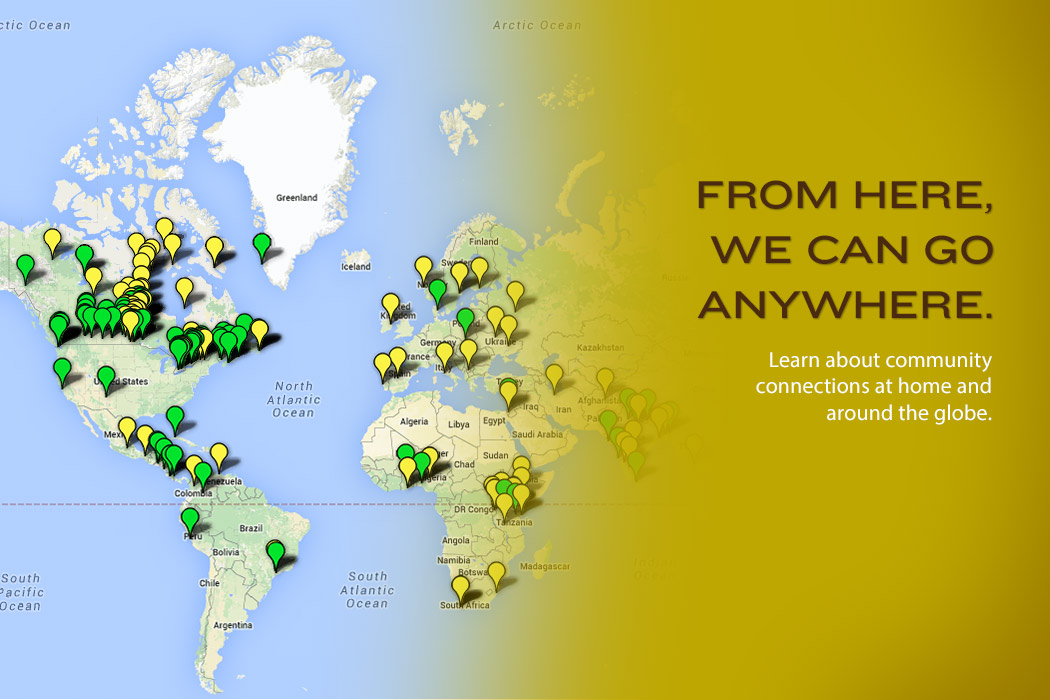
Top 10 Community Stories
In September 2014, the Office of Government and Community Engagement launched a website to showcase the global impact of the University of Manitoba. The community stories website identifies more than 300 examples of community engagement and its complementary section within UM Today showcases over 50 stories of how our faculty, students and staff have made a difference all over the globe.
Below you’ll find 10 of our favourite stories from that list, featuring everything from local Indigenous youth programs to helping to grow better food in Nigeria. For the full list, click here.
Finding solutions together: Partnerships for safe drinking water
The CREATE H2O initiative launched in 2013 as the first science-engineering research training program in Canada to combine technical water and wastewater management training with Indigenous theory, law and methodological skills training. It fosters respectful relationships between First Nations and researchers, allowing for meaningful collaboration. This enables our researchers to contribute to a growing intellectual movement of decolonizing research and methodologies within the academy.
Business ‘boot camp’ for Aboriginal youth: developing tomorrow’s entrepreneurs
The New Venture Adventure Camp, a one-week business simulation camp for twenty pre-selected female Aboriginal students. The camp is run by the Stu Clark Centre for Entrepreneurship at the University of Manitoba. Participants are already involved with WASAC (Winnipeg Aboriginal Sport Achievement Centre), an organization that develops leadership and mentorship skills for Aboriginal youth through sport and recreational programs.
A better future: connecting mentors with Indigenous youth
Rec and Read is a safe and culturally affirming recreation program designed by, and for, Aboriginal youth and other young people from diverse populations. Founded by Kinesiology and Recreation Management Prof. Joannie Halas, the program connects university staff and students with local schools, community agencies and government partners to plan and deliver weekly after-school physical activity, nutrition, and education activities for early-years students.
A world-wide network: Improving Indigenous health
Catherine Cook, associate dean, First Nations, Metis and Inuit Health, College of Medicine, Faculty of Health Sciences helped to establish the International Indigenous Academic Health Network, which connects the University of Manitoba with medicine faculties at institutions worldwide, including the Universities of Auckland and Otago in New Zealand, the University of Hawaii and the University of New Mexico.
Experiential Learning: finding Sustainable solutions in Honduras
Engineering professor Kris Dick and his students founded the Growing Village, a U of M research project focused on alternative and sustainable buildings and associated construction technologies. Every year, they travel to the surrounding areas of Gracias Lempira, Honduras, where they work with locals to implement their designs. Projects are chosen through collaboration with NGOs and local community leaders. To date, they have included housing, rainwater collection systems, water filtration systems, latrines and stoves.
Construction projects in Ghana, Sri Lanka, Uganda and Turkey: Giving students global context
Since 2005, 63 students, seven faculty members and hundreds of community members have collaborated on construction projects overseas—from a primary school library in Ghana to a tea house in Turkey—in the travel-study course Service Learning in the Global Community (SLGC) led by Kelley Beaverford, Faculty of Architecture associate professor.
Connecting with the North: Learning alongside top researchers in the Arctic
Schools on Board, an outreach program of ArcticNet, based out of the Clayton H. Riddell Faculty of Environment, Earth, and Resources, bridges Arctic research with science education in high schools across Canada; increases awareness of issues related to climate change in Canada; and educates young Canadians about the challenges and career opportunities involving Arctic research.
Street level science: Shaping tomorrow’s trailblazers
The Biomedical Youth Program (BYP) is a School of Medicine initiative that connects with Manitoba’s inner-city and disadvantaged youth to instill a love of science. Young people explore research hands-on in three labs—biotechnology, physics and imaging, and chemical sciences—located in the heart of Winnipeg’s North End.
Empowering Women: Growing healthier food in Nigeria
The Nigerian Indigenous Vegetable Project is a partnership between the University of Manitoba, Cape Breton University and two universities in Nigeria—Osun State and Obafemi Awolowo University. This joint project aims to improve the diet and income of people in Southwest Nigeria—particularly women—by developing new ways to farm and market wild vegetables previously overlooked by locals. U of M soil science professor Wole Akinremi is a principal investigator on this initiative, which is carried out in four states: Osun, Oyo, Ondo and Ekiti.
Stopping a second emergency: Improving treatment for kids in Canada’s general emergency rooms
The Translating Emergency Knowledge for Kids (TREKK) project equips general emergency departments with the knowledge and awareness required to provide proper and adequate care for children. Led by Terry Klassen, head of the department of paediatrics at the U of M, medical director of the Child Health Program for the Winnipeg Regional Health Authority, and director of research for the Manitoba Institute of Child Health (MICH), the program involves partnerships with 37 general emergency departments across Canada in urban, rural and remote areas, spanning nine provinces and one territory and has great potential to improve paediatric emergency care across Canada and even worldwide.






